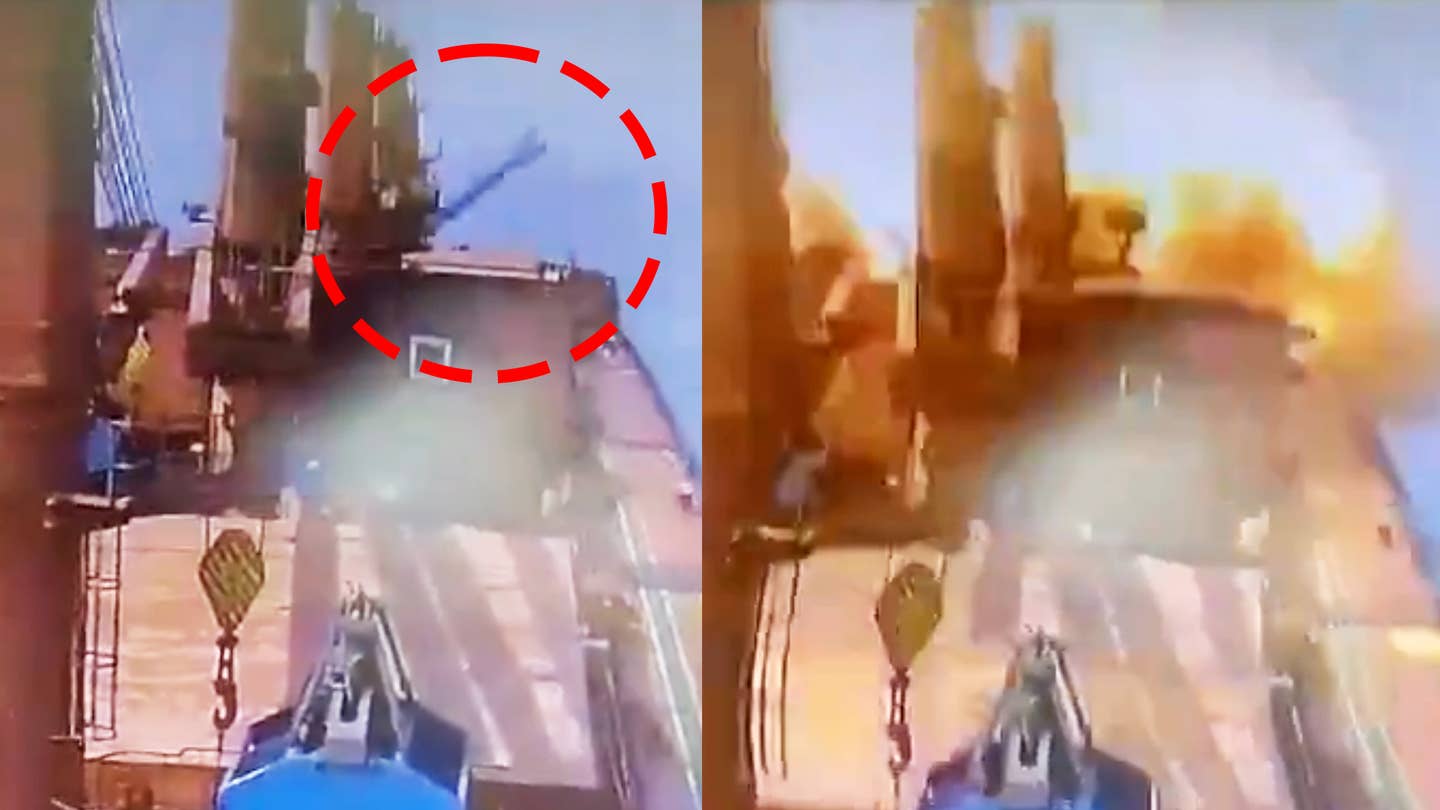The video shows one of the Houthis’ Iranian-derived anti-ship missiles impacting the bulk carrier M/V Zografia in the Red Sea.

After many attacks in recent weeks on ships traveling through the southern Red Sea, Bab el-Mandeb Strait, and Gulf of Aden, we are finally getting a glimpse of a Houthi anti-ship missile impacting a vessel.
The crisis in the region has seen cruise missiles and drones being used against vessels, but it also marked the first operational use of anti-ship ballistic missiles (ASBMs), which has its own implications. While many are saying this shows an ASBM strike, and it very well could, we cannot make that same definitive conclusion based on close examination of the video.
The footage is from closed circuit camera system aboard the M/V Zografia, which was struck three days ago in the Red Sea. At the time, CENTCOM stated it was hit by an ASBM. Now we can see that strike for ourselves.
The weapon hits between the middle and the bow of the ship, at roughly a 45-degree angle and high-speed. The resulting explosion is sizable. The beam of the vessel is stated publicly as 105 feet (32 meters). It’s hard to gauge the missile’s length based on the single still frame we have of it as it impacts the ship. The Houthi’s Asef ASBM, which is derived directly from Iran’s Fateh-313, is roughly 30 feet long (around nine meters), and is the largest purpose-built ASBM the Houthis have in their arsenal. The Iranian-backed group has numerous smaller ABSMs and larger ones converted from old Soviet SA-2 surface-to-air missiles, as well.
Via X (screencap)
©2023, The International Institute for Strategic Studies, originally published on https://iiss.org/online-analysis/military-balance/2024/01/houthi-anti-ship-missile-systems-getting-better-all-the-time/ (reproduced with permission)
The Houthis also have numerous anti-ship cruise missile types. While at first glance this does look like an ASBM, closer examination seems to depict wing structures emanating out of the middle of the weapon like that found on a cruise missile. The Quds Z-0 is one possible match here. It’s simply too hard to tell for sure based on what is a video of a monitor showing a closed-circuit video. While CENTCOM reported this as a ballistic missile strike, it isn’t clear exactly what information they had to conclude that at the time or if that assessment still stands.
Via X (screencap)
©2023, The International Institute for Strategic Studies, originally published on https://iiss.org/online-analysis/military-balance/2024/01/houthi-anti-ship-missile-systems-getting-better-all-the-time/ (reproduced with permission)
A CENTCOM statement released on January 16th following the strike read:
“On Jan. 16 at approximately 1:45 p.m. (Sanaa time), Iranian-backed Houthi militants launched an anti-ship ballistic missile from Houthi-controlled areas of Yemen into international shipping lanes in the Southern Red Sea. M/V Zografia, a Maltese flagged bulk carrier reported they were struck but seaworthy and were continuing their Red Sea transit. No injuries were reported. Earlier in the day at approximately, 4:15 a.m. (Sanaa time), U.S. Forces struck and destroyed four Houthi anti-ship ballistic missiles prepared to launch from Houthi-controlled areas of Yemen.”
The Houthis released the following statement following the attack:
“The naval forces of the Yemeni Armed Forces, with the help of God Almighty, carried out a targeting operation against the ship ‘[Zografia],’ which was heading to the ports of occupied Palestine, with a number of suitable naval missiles, and the hit was direct. The targeting operation came after the ship’s crew rejected warning calls, including fiery warning messages. The Yemeni armed forces will continue to implement the decision to prevent Israeli navigation or those associated with the Israeli enemy in the Red and Arab Bahrain until the aggression is stopped and the siege on the steadfast Palestinian people in the Gaza Strip is lifted. The Yemeni Armed Forces continue to take all defensive and offensive measures within the legitimate right to defend dear Yemen and in confirmation of continued practical solidarity with the oppressed Palestinian people.”
Regardless of the missile type depicted in this video, the naval activities off Yemen are a major geopolitical event in their own right, but the introduction of ASBMs is truly a historic moment in naval warfare. It’s especially notable that the Houthis are the first ones to fire them in anger. Their arsenal is downright rudimentary compared with far more advanced types existing in potential enemies’ arsenals, especially China’s.
Beyond that, at least now we are getting video showing what these attacks look like from the crew’s point of view.
Contact the author: Tyler@thedrive.com


